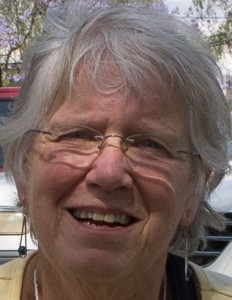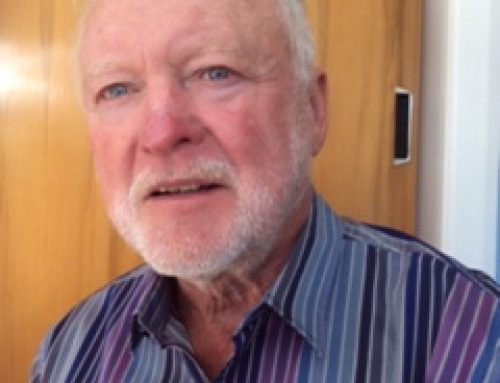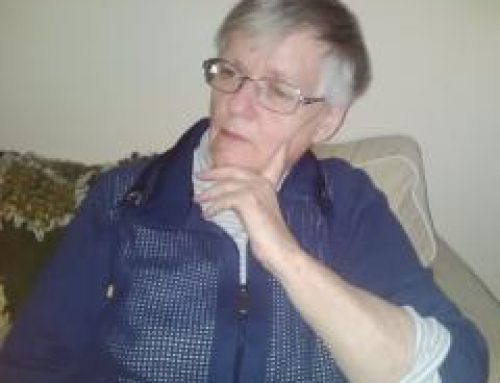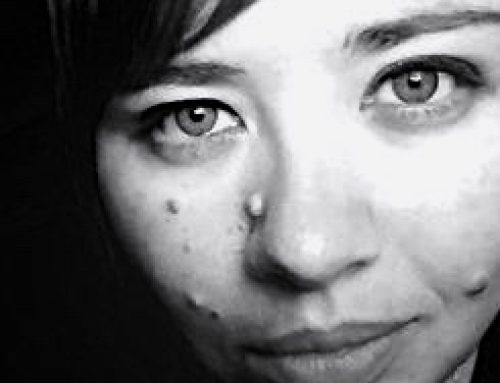Rachel is driving the riding mower back and forth across the lawn, the first mowing of the season. It’s springtime-cool—she’s wearing a light jacket, and a bright red scarf holds back her greying curls—but the midday sun is warm on her back. As she backs up to manoeuver around the hawthorn bush, she glances across the expanse of green to the house, where the rose bushes beside the deck are just putting out leaves. When she and Tom moved onto this farm forty years ago, a small yard surrounded the house. Back then, she pushed an old mower that spewed out black smoke while the kids piled up the clippings to make hay for toy cows.
Now, the lawn is huge, estate-like. As she circles around, she thinks about how each part was added. First, they carved a mammoth garden plot out of an adjacent field; as the garden gradually shrank to a manageable size, they began mowing around the edges. Then, they fenced in an area near the house for their daughter’s horse; when the horse moved on to another child on another farm, they started mowing that chunk too, since they’d become used to seeing it chewed down. Twenty-five years ago, when they sold the last of their cattle, the barnyard next to the house started growing unsightly weeds, so they mowed that. Eventually, they had to tear down the old barn itself, and that space needed to be tidied up too. Now, they spend three hours on a riding lawnmower every week from May to October. Except for the mowing, they rarely step onto the grass. Their lawn has become an environmentally embarrassing objet d’art in an ever-expanding frame.
“A non-mow yard, that’s what I want,” says Rachel later, propping her feet up on the deck railing and letting her red scarf blow free in the early evening breeze. She’s sipping her evening glass of wine. White, chilled. Tom’s having a beer. He nods. She imagines spring daffodils among birch clumps, giving way to wildflowers and a few mowed paths into the woods.
Three weeks ago, a man with a briefcase came to tell Rachel and Tom what their home of forty years was worth. He used a tape measure and a questionnaire, checked out the pipes and the heating system, looked for moulds and water damage. He didn’t gaze out the kitchen windows at the greening hill or look for migrating ducks on the river that runs along the edge of the farm. He went away, studied his findings, checked on what other people’s homes have sold for, and came up with a number.
Lots of their friends are doing it, calling it downsizing—though the size is not always smaller—but until now, Rachel and Tom have resisted. Now, following some instinct they can’t identify, they’ve decided it’s time. “We’ll do it while we’re still fit and healthy, while it can still be an adventure,” says Tom.
They have been married for forty-five years. A vanishing breed, they often say, almost extinct, noting how many of their friends have separated and moved on to second, even third, marriages. It hasn’t been easy. For many years—raising their three children, managing a small farm, trying to juggle careers to keep the farm going—their marriage remained intact due more to the combined forces of inertia and insecurity than to a great shared affection. But that was then. Now, they’re moving into later years more or less in sync, grateful for whatever forces kept them together.
“I don’t know if I feel like an adventure,” says Rachel. “I’m more a nester. I need to have a home.” She draws a shaky breath. “It doesn’t have to be this one, I know. But it’s hard to imagine any other.”
She looks across the fields, familiar expanses of green with their own names—the far field, the red clover field, the barn field—and wonders, as she has been wondering often, what makes a home? Bricks and mortar? Overflowing bookshelves and too many sets of dishes? Tea and the sympathy of friends? A soft place to land?
It’s the landing that’s at the root of all this, she thinks. Not knowing when or where it will be. Not knowing the best way to make it soft. Will it be an emergency landing on rough terrain, no time to search for a landing strip? Will it be a slow, gradual descent, ending softly at a predetermined location? Or will it be a drop through turbulence, out of fuel, a bounce, a gasp, followed by what? Relief? A parachute unfurling just in time?
Rachel is a writer. She begins every day sitting in front of her laptop, hoping for inspiration. You’re not supposed to wait for the muse; she knows that, and she tries not to. Show up at your desk every day so you’re ready and waiting if the muse happens by. So, she always writes something. But she’s impatient, and when inspiration fails to materialize in the form of coherent ideas and words on the screen, she finds herself thinking it may be lurking on Facebook, in the telephone voice of a friend, or in Tom’s studio, where she often goes to share her frustration.
Tom is an artist. She thinks he’s probably a better artist than she is a writer. He’s more successful, at least, if getting attention and selling stuff is the measure. He’s also more persistent. He never waits for the muse. He doesn’t actually believe in muses.
Writer and painter are their late-life personas, created in their sixties to carry them gracefully from their professional lives into retirement. At the moment, it’s not feeling very graceful to Rachel, who agonizes over the passing years, the shortening horizon, the pressure to prepare for the threat of infirmity.
With the man’s numbers in hand, they’ve started looking at real estate in the city. I need a big kitchen, Rachel says, and a room to write in. I need a studio, Tom says. They both want a view, trees, privacy, places to walk, and high-speed Internet. They hate to admit how important high-speed Internet is, but after years of fiddling with satellite dishes in the country, it’s one of the big draws of city life. They don’t mention this to their country friends and neighbours, who will see them as traitors to the simplicity they all pretend to embrace.
The house, says Tom, should be a single floor. Or at least have a bedroom on the main floor. Just in case. Rachel agrees. He is on his way to play tennis. She is returning from her daily walk. They’re having trouble imagining the unimaginable. Immobility. Fragility. Aloneness.
That evening, Rachel heads upstairs to take a bath. She keeps the hot water dribbling in, lets the excess seep out the overflow, and leans against the gently sloping porcelain back of the old claw-foot tub. On the other side of the window at the foot-end, the elm tree is putting out its spring growth. Nobody would put a window level with the bathtub anymore—for fear of tree-climbing perverts, she supposes, and she snorts at the thought as she looks down at her sagging breasts and bulging belly.
Padding down the stairs, wrapped in a towel and leaving wet footprints on the oak steps, she tells Tom she would need a bathroom with an old iron, claw-foot tub and a view. He scrunches up his brow the way he does when he thinks she’s being silly and says the thing about that bathtub is, it would be hard to get into if you were frail.
“When you’re frail, you mean?” she says.
“Well, you never know,” he says.
“So, I’m supposed to buy one of those walk-in tubs on TV? In case I’m frail?” She’s not sure where her anger is coming from.
Rachel has decided not to plant a vegetable garden this year. She can’t bear the thought of tucking each row in for the last time. Of looking across the May-green fields at the hill with its kaleidoscope of spring greens. Of sitting back on her haunches to watch the circling hawks. There will be so many goodbyes. Out of long habit, she pulls the wheelbarrow out of the garden shed, pushes it through the muddy ditch leaving a tire mark in the grass, and begins pruning back the rose bushes, their thorns drawing blood on her forearm. The garlic has poked through the winter mulch, so she rakes that off to examine the shoots—dark green at the top, pale where the mulch has covered them. I could probably plant some lettuce now, she thinks, without thinking. A bit of spinach. Chard. A few onions. Not a real vegetable garden. Just a few things. Maybe some tomatoes, later. And carrots.
At supper that night she says, “I think I would need space for a vegetable garden. Just a small one.”
Every day, Rachel walks along the river for a mile and a half before turning back. On one side, she watches the river make its brown, sluggish way to the bay and notices how, over many years, tag alders have grown up along the shore; on the other, she looks at the fields and remembers sweltering days on hay wagons, dreamy days ploughing and harrowing, children carrying pitchers of water and eggnog to the tired crew. This is what home is, she thinks. Memories.
She covers the three miles in fifty-five minutes. She checks her time every day, making sure she’s not slowing down, which would be a sign of impending frailty. Sometimes it’s fifty minutes, which makes her feel strong and young. Sometimes it’s an hour, which makes her worry and pick up her pace the next day. Lately, it’s been an hour more often than she likes.
In forty years, Rachel hasn’t learned the names of the resident ducks—never mind those who stop briefly during migration—but she’s always glad to see them back, glad to see them emerge from the river’s edge with their clutch of ducklings, glad to watch the thick stick on the shoreline turn into a heron and rise awkwardly skyward as she approaches on foot. Once she saw a swan floating down the river. She has decided to become a birder, though she’s not quite sure how to start and wonders if her lack of interest during her first six decades might suggest a deficiency in the intellectual curiosity department, something she’s suspected on and off all her life. Still, she now carries binoculars on her daily walks, even though stopping to look at birds messes up her time-keeping.
She is clinging to the normalcy of it all, afraid to look too far beyond this moment, these memories. She sometimes feels that her very self depends on the leash holding her to this home. And now, that leash has shrunk to a mere thread, one that becomes thinner every time the realtor phones with another house to view.
Needy. That’s how the realtor describes them, only half-joking, after they’ve turned down yet another home that doesn’t meet their long list of criteria. In the end, though, the change happens quickly. The house is not perfect, but it’s close enough and they have tired of the process. Their son, Greg, buys the farm and helps them pack up, sell, or dispose of the accumulations of a lifetime.
The new house has a large living room with a vaulted ceiling and French doors opening onto a spacious deck overlooking a small, enclosed yard—not the expanse of trees they’d imagined but green enough, with space for a small garden, and quiet. The kitchen is smaller than Rachel had hoped for, but her study window looks out on a tree. She enjoys watching the chickadees and grosbeaks at the feeder, but she misses the hawks she watched soaring across the fields from her old study window. The new bathtub is shallow and uncomfortable; mostly she takes showers. Tom sets up a study in the third bedroom and his studio in the basement. They both love the high-speed Internet.
They carry on their lives as they had before the move. Almost. She writes, submits, waits, resubmits, and keeps writing. Occasionally, she publishes an essay or a short story in one of those quirky magazines no one she knows reads—which is fine with her, because those are the people she’s writing about. He spends most of his time painting, and travelling to local shows where he often sells a few paintings, but never enough to keep the inventory from building up, so the walls are filled with his art. They share quiet moments over morning coffee and evening wine—companionable, rarely passionate, more likely to be enflamed by global crises than carnal desire.
Tom has started going to the gym, something he’d never done before. Rachel still walks when weather permits, though she misses the level riverside road. “I think a city mile must be longer than a country mile,” she says when she returns after more than an hour. “I can’t keep up my old pace. It must be the hills. Or maybe my watch is off. It’s certainly not ducks on the river!”
Most of the time, she manages to convince herself that they’ve made the right decision to leave the old farmhouse. Life is easier now, and she has built a wall between the past and the present with a locked door she opens only occasionally with a well-hidden key.
Greg has moved into their old house and replaced the claw-foot tub with a Jacuzzi. His wife, Caroline, put the old tub in the front yard and has planted it with petunias and nasturtiums that splash over the sides like a Crayola bubble bath. Meanwhile, Rachel’s old garden has grown up in weeds. When she allows herself to mourn aloud about the tasteless and shabby condition of their home, Tom reminds her that it is no longer theirs, as if she needs reminding. When they go to their son’s house for supper—which is rare—Rachel can’t find the cutlery, and the toilet water is blue. For some reason, the blue toilet water bothers her more than the overgrown gardens or the chipped tiles on the kitchen counter.
“It’s not good for the septic system,” she says to Caroline, and Tom glares at her.
“Just saying,” she mutters.
She always leaves with tears in her eyes, and it’s a relief to walk back through the wall into the present, where the toilet water is clear, the knives and forks are in their proper places.
One night, after such a visit, Rachel dreams she is flying a red kite on the field beside the river. Then, she becomes the kite and soars over the landscape of her life—the house, which is both her house and not her house, with porches in the wrong places and paint peeling around the windows; the vegetable garden, in neat rows of green; the old barn, gone these twenty years, standing tall and straight; cattle milling about, drinking water from an old claw-foot bathtub. As she soars closer to the hill, she looks down on the tiny figure of Tom who is holding the kite string taut against the power of the wind. He lifts his hand to wave to her and releases the string. Slowly, the wind pulls her over the hill and out of the dream.
When she wakes, Rachel stares at the ceiling of her new bedroom, where a fan turns slowly, barely visible in the dark, its rotations creating the faintest breeze in the night. Tom is lying beside her, snoring softly. He shifts, as though responding to her wakefulness. The clock radio on Tom’s side of the bed reads three-thirty. Neither night, nor morning. With the dream still fresh on her mind, Rachel pulls back the covers and slips out of bed, trying not to jostle either Tom or the memory of flying high and free over the fields and hills that, for the moment, are hers again. She wanders into the kitchen for a glass of water, wondering where her kite-self was drifting when the dream left her, where she landed, and why Tom released the string.
That morning, Greg phones. “Mom, you left your red scarf here yesterday. Annie noticed it way out on the field, stuck to a thistle. Must have blown there. I didn’t think it was that windy. We’ll hang on to it for you.”
Rachel thanks him and tells him to thank six-year-old Annie. Puzzled, she goes to her scarf drawer where her only red scarf is neatly folded halfway down the pile. She shrugs off a fleeting, uneasy feeling—a splash of red in the wind—and phones Greg back.
“That scarf. It’s not mine.”
Later in the day, she returns from her walk, out of breath, to a message from the doctor’s office: “Please call.” She’d been tired, depressed, slower to adjust to the move than she’d expected. Get a check-up, Tom had said, just to be sure. The doctor wants to see her first thing tomorrow morning, says the receptionist, to discuss the results of her blood work.
“Is something the matter?” Rachel asks, forcing the words through a lump that has moved rapidly from her stomach to her throat.
“The doctor wants to discuss the results,” the anonymous and now-ominous voice repeats.
That night, she barely sleeps, and when she does, she dreams of white sheets blowing in the wind and vials of black-red blood spilling onto the kitchen floor.
Tom accompanies her to the doctor’s office, where the receptionist ushers them into an office with a large oak desk and two vinyl-upholstered chairs. Rachel’s heart is pounding. Her breath is rapid and shallow. Tom takes her hand. After a few minutes, the doctor enters, his white coat unbuttoned, a file folder in his hands. He shakes their hands, smiles, sits down behind the desk, and looks directly at Rachel.
“We have found some irregularities in your blood work that probably explain the way you’ve been feeling, Rachel,” he says. He hesitates and looks towards the window. Rachel hears herself inhale.
“We will need to confirm the diagnosis with further tests, but it looks like you are suffering from an aggressive leukemia, which would require quick and intensive treatment. Dr. Higgins wants to see you in the hospital this afternoon at four o’clock. He may choose to admit you and begin chemotherapy right away.” The doctor pauses. “Dr. Higgins is a first-rate oncologist.”
“Admit?” Rachel hears Tom speak through the pounding in her ears. “People don’t get admitted for chemo.”
“You’re right. Not usually. But for this one, they often do.” He’s looking at Rachel again. “It will be up to Dr. Higgins, but you may be hospitalized for several weeks.”
Rachel feels Tom’s hand tighten on her own, a single point of sensation on the numbness that has become her body.
“What does this mean, exactly?” It’s Tom’s voice again. She stares at the doctor without seeing him. He hesitates, clearly unsure whether or not to speak. When he does, Rachel senses a shift in his tone.
“This will not be an easy time for you, Rachel. Or for you, Tom. There is an excellent chance of remission in the short term, but also the likelihood of a recurrence—sometimes sooner, sometimes later. It’s a painful wait-and-see game. And I believe in being honest. The long-term recovery rate for this cancer is below fifty percent in your age group, and the progress of the disease can be rapid.” He looks squarely at Rachel again. “Dr. Higgins is the best. He’ll give it all he’s got, I promise you that.”
Back at home, Tom phones Greg and their daughter, Ellie, who lives in Vancouver. Rachel hears him from the next room, speaking in a murmur. Part of her wants to shout, “Just tell them I’m dying!” But when she opens her mouth, a choking sob emerges. With her mind focusing only on the immediate task, she packs a small bag for the hospital. At the last moment, without knowing why, she tucks her red scarf in with her bathrobe, slippers, and toothbrush.
A young nurse in navy blue pants and a yellow shirt with a teddy-bear print pulls a curtain around the hospital bed and wheels in a cart full of clear plastic vials. She inserts a needle into Rachel’s arm and extracts vial after vial of blood, which looks normal enough.
“Probably it’s all a mistake,” she says to Tom, who is in the chair beside her, doing a Sudoku on his iPad. When he looks up, she sees fear in his eyes.
Three hours later, her doctor arrives with Dr. Higgins. They pull the curtain around her and refer to the printouts in their folders. The oncologist begins to speak. Rachel feels her future slipping away from her. She is trapped in the present, in a home without windows, without gardens, without a soft place to land.
After a restless night, Rachel eases herself off the bed and onto the floor, slides her feet into her slippers, and makes her way to the bathroom. She faces herself in the mirror hanging over the stark white sink and sees a woman who bears no resemblance to the one who returned from her walk, slammed the front door behind her, and pressed “play” on the answering machine two days ago. Her unruly grey hair frames an ashen face, and dark smudges surround her frightened eyes. When she reaches into her bag, fumbling for her toothbrush, her hand pauses at its first encounter. She pulls out her long red scarf, stares at it without remembering, then wraps it around her neck. She looks into the mirror again, and this time the pale face greets her with the faintest smile, the jaunty redness of the scarf a talisman against the pale green, hospital-issue gown.
As she was warned it would, the chemotherapy leaves her sick, exhausted, hairless. She sleeps most of every day and has no interest in going home. When she does finally return home, thinner and frailer than she has ever been, with the red scarf tied over her bald head, she is thankful for the single floor house, the sunny deck—even the low-walled bathtub.
A week later she returns to the hospital lab for another round of blood work, and for the next two days she tenses every time the phone rings. When the call comes, Tom puts his arm around her and they listen together as Dr. Higgins shares the latest results: her cancer is in remission. Rachel will return for further treatments next month, this time as an outpatient.
“In the meantime, build up your strength,” the doctor says. “Eat. Rest. Laugh.”
She and Tom embrace, laugh, and do a quick dance around the kitchen table. She feels the door to the future opening a crack, a breath of air passing over her head, fluttering the tails of her red scarf.
As soon as she is strong enough, Rachel wants to visit the farm. Tom hesitates.
“You know how you feel when you’re there,” he says. “The blue toilet water,” he laughs. “The unmown lawn, the messy house.”
“No,” she says. “I need to go. The leaves will be turning now. I need to see the hill. And the river.”
And so they go. They follow the familiar route out of town—the route home—along the river where mirror images of red and gold reflect on the dark, barely moving water. The hill—their hill—stands as it always has, rising abruptly at the back of the fields. They pull into the driveway, past the old bathtub with its spent blooms dangling from withered stems. Annie comes running out to meet them.
“Grandma! Mommy made brownies,” she says. “Just for you. Because you’re sick.” Rachel takes the girl’s hand and walks with her up the brick walk and into the kitchen where Caroline is shoving dishes aside on the counter to make space for a baking pan. Greg walks across the kitchen to give her a hug. He is large and strong, and his bear hug knocks the red scarf off her head. She laughs as he lifts her off her feet. “You look better.” He rubs his hand over the downy growth on her scalp. “How’re you feeling?”
“Good. I’m fine. It’s good to be here. With you.” Here, she says, not home.
Dust covers the old cast-iron cook stove that Rachel used to polish to a shine; someone has dragged a sharp object across the maple floor, leaving a deep scratch in the surface; the autumn sun struggles to make a statement through grimy windows. Rachel notices these things, but the place smells of chocolate, and she sinks gratefully into the sofa, looking out the bay windows where she sees Annie running across the field, string in hand, a red kite bouncing on the ground behind her. Rachel gasps as the kite catches the wind and begins to soar.
“Great kite,” says Tom. “It looks homemade.”
“Yup,” says Greg. “Annie found the cloth on the field last spring. At first, we thought it was Mom’s scarf. It’s perfect kite material, so we made it together. Just look at ’er go.”
Rachel feels a chill, like a cool breeze, as she stares out the window at Annie, whose whole being tenses against the pressure of the wind and the rapidly unwinding string.
“Tom.” She is barely whispering. “Don’t let that kite get away again.”
Tom looks at her strangely. “She’s fine,” he says. “She’s really got the knack.”
“Please,” begs Rachel. “Help her.” Her breath is shallow. Greg gives his mother a worried look, and turns to Tom.
“She probably could use a hand, Dad.”
Tom shrugs and goes out the back door, calling to Annie, “Atta girl, Annie! Hang on there!”
Rachel rises from the sofa to watch as Tom places his hands over Annie’s, tightening the string, guiding the fluttering red sail. They are both laughing as they bring the kite in. Rachel braces herself, feels herself steadying, slowly descending. Landing with a jolt, she settles onto the sofa, limp and relieved.
Caroline comes into the living room with mugs of coffee and a plate of brownies. “Sweets!” she says. “Good for whatever ails you.” She looks at Rachel and smiles. “You need to put on some pounds. Have two!” Her eyes are warm, as she puts the tray down and gives her mother-in-law a hug.
She looks comfortable, thinks Rachel. Like she belongs here.
Suddenly a door to the past opens into this very room where another young mother, overwhelmed by the demands of children and a farm, sits collapsed on a worn sofa. Toys are strewn on the floor. Baskets of laundry wait to be folded. A glass of something congealed sits on the coffee table beside her. The acrid smell of wet diapers seeps into the room. The door slams shut as quickly as it opened, and Rachel takes a bite of brownie. Sweet and chocolatey and warm.
“Before we go home, I’d like to take a little walk along the river, see the colours,” says Rachel. “Winter’s coming. I don’t know when I’ll be back.” She reaches up to straighten the scarf on her head and touches bare scalp.
Annie sees her question before she can ask it: “Here it is, Grandma!” she says. “It blew off when you came in the house, but I found it for you. You should put it on. You look funny without any hair.”
Rachel ties the scarf snuggly around her head, takes Annie by the hand, and says “Come on, kiddo. Let’s check out your river before Grandpa and I go home.”
July 2015

 Paula Dunning is a retired freelance editor who lives in Echo Bay, Ontario where she writes memoir and essays, and is beginning to turn her hand to fiction. Her memoir explores her personal journey through the 1970s as a young urban woman who went “back to the land.” Her essays have been aired on CBC Radio’s The Sunday Edition.
Paula Dunning is a retired freelance editor who lives in Echo Bay, Ontario where she writes memoir and essays, and is beginning to turn her hand to fiction. Her memoir explores her personal journey through the 1970s as a young urban woman who went “back to the land.” Her essays have been aired on CBC Radio’s The Sunday Edition.



